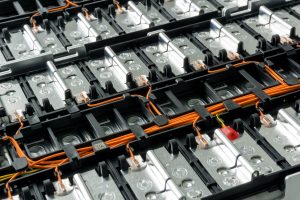Silicon has long been recognized by researchers as a potential battery material to enable high performance at lower cost. But the properties of silicon, namely its thermal expansion when used as an electrode, have prohibited its adoption to date. A battery cell that incorporates nanoscale silicon particles may help accelerate electric vehicle adoption by reducing vehicle weight, charge time and carbon emissions.
SiMat EnerTech is the creator of a new 18650 lithium-ion battery cell that is targeted for use in electric vehicles (EVs). The company is also developing a smaller pouch cell to be used for cell phones. SiMat was co-founded in 2019 by Christopher Passolano, the company’s chief engineer, who is an Illinois Institute of Technology (IIT) Ph.D. student. Passolano co-founded SiMat EnerTech with Leon Shaw, Ph.D., a professor of Materials Science and Engineering at IIT and Passolano’s advisor.
“Our innovation is unique because our batteries are almost entirely silicon,” Passolano said, noting that SiMat’s batteries are comprised of 65 percent silicon.
“These battery cells also involve environmentally safer production, which incorporates thermodynamics instead of a dangerous chemical commonly used by competitors,” Passolano said.
Passolano joined Chain Reaction Innovations’ (CRI) Cohort 4 at the U.S. Department of Energy’s (DOE) Argonne National Laboratory in June 2020. CRI is a two-year entrepreneurship program that embeds innovators in the Lab to help them grow their early-stage technologies. While embedded, Passolano has worked with Andrew Jansen, Ph.D., a chemical engineer in Argonne’s Chemical Sciences and Engineering division and a world-renowned expert on lithium battery technology.
Impact
SiMat EnerTech’s battery cells are different from other battery cells currently on the market in several key ways. First, the cells incorporate a large amount of nanoscale silicon particles, which are engineered in a way that allows the batteries “to fit more lithium into the cell per structure area,” Passolano said.
“The method of engineering is what makes us unique,” he said.

This engineering produces long-lasting, more efficient batteries that help increase battery life, reduce vehicle weight, and decrease charge time. The reduction in weight also helps decrease vehicle cost. By making EVs more affordable, durable and efficient, consumers have more reason to opt for electric vehicles, which would reduce CO₂ emissions.
SiMat EnerTech’s technology has the potential to accelerate this adoption of electric vehicles through improved battery performance and lower cost. If SiMat EnerTech’s technology accelerates electric vehicle adoption by one year, compared with current predictions for electric vehicle adoption, the additional emissions reduced would average 65-125 MtCO2e per year over the next 30 years.
“These battery cells also involve environmentally safer production, which incorporates thermodynamics instead of a dangerous chemical commonly used by competitors,” Passolano said.
How it Works
SiMat EnerTech’s 18650 lithium-ion battery cell used in EVs is known colloquially as a “jelly roll cell.” It is twice the height and a little wider than an AA battery. For example, a Tesla model S has nearly 8,000 of these lithium-ion battery cells in a pack, which accounts for about 40 percent of the cost of an EV and over 35 percent of the vehicle’s weight.
Inside the 18650 battery cell is an aluminum coated cathode—the positive side of the battery where lithium as well as nickel, manganese and cobalt are stored; an electrolyte-coated plastic separator; and a copper coated anode which is the negative side of the battery where nanoscale silicon particles are stored.
“Silicon has probably the highest electrical potential, next to lithium, out of all the elements as far as anodes go,” Passolano said.
Since Passolano joined Cohort 4, SiMat EnerTech has been able to extend the lifetime of its materials and is currently working on prototypes for both battery cell formats.
SiMat EnerTech’s beachhead market will be manufacturing its battery cells for EV cars and trucks, later branching out to consumer electronics, drones and planes.
The Goal
“We’re helping to reduce the everyday cost that manufacturers face and provide them with better energy efficiency for their consumer product needs,” Passolano said.

